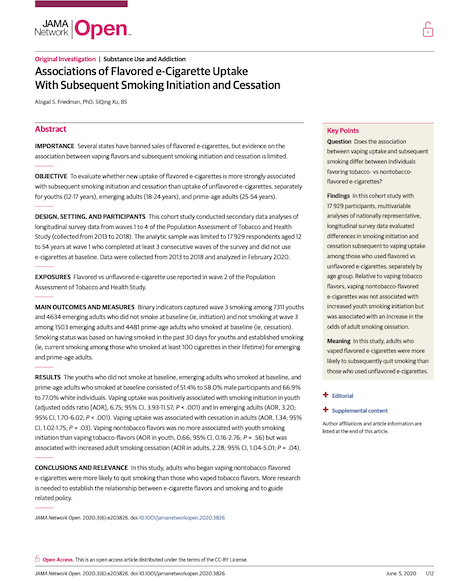America has been hyping up a link between teen vaping and progressing on to smoking cigarettes for a number of years, known as ‘The Gateway Effect’. This has led to anti-vaping zealots creating a fictional bracket of juices they say come in ‘child friendly flavours’. Many states suffering from declining tobacco revenue have either banned or are looking to ban flavours other than menthol or tobacco.
Friedman and Xu posed themselves a question to answer: “Does the association between vaping uptake and subsequent smoking differ between individuals favouring tobacco- vs nontobacco-flavoured e-cigarettes?”
 To answer it, they looked at the data from 17,929 teens and adults from the Population Assessment of Tobacco and Health Study (PATH Study) from 2013 to 2018.
To answer it, they looked at the data from 17,929 teens and adults from the Population Assessment of Tobacco and Health Study (PATH Study) from 2013 to 2018.
The study was justified by them stating that, “advocacy groups and the American Academy of Pediatrics emphasize that nontobacco flavours may motivate youth vaping (i.e., e-cigarette use) and increase conventional cigarette use.”
Some people believe 5G technology ‘may’ cause COVID-19, conducting studies because fear merchants ‘believe’ something gets the research off to a slightly flawed start.
They state: “Industry representatives claim that such flavours are critical to attracting adults who smoke and want to quit.”
What they omit to mention is that virtually all current vapers are ex-smokers and say in unison that this is the case – the industry is simply reflecting consumer demand.
The pair do acknoledge: “Randomised clinical trials show that e-cigarettes can aid in adult smoking cessation. These findings may apply to adolescents who smoke, although that evidence is less robust.”
They also noted the study demonstrating that, “a federal ban on e-cigarette flavours would increase smoking, whereas banning menthol conventional cigarettes would reduce smoking.”
“This study’s findings support both sides of the current argument about the relationship between vaping and smoking,” they concluded.
Abigail Friedman, assistant professor of health policy and management at the Yale, told journalists: “Adult smokers who took up vaping non-tobacco-flavoured e-cigarettes were more likely to quit smoking than those who took up tobacco-flavoured e-cigarettes.”
She went on to say that flavours did lead to increased teen adoption of smoking, but this contradicts her paper (and defies ever-declining teen smoking rates) that says: “Favouring flavoured e-cigarettes was not associated with greater youth smoking initiation but was associated with greater adult smoking cessation.”
“The odds of cessation for those favouring nontobacco flavours were 2.3 times that of those who used tobacco-flavoured e-cigarettes.”
“Critically, this study’s findings suggest that efforts to ban flavoured e-cigarettes could increase smoking.”
Related:
- ‘Associations of Flavored e-Cigarette Uptake With Subsequent Smoking Initiation and Cessation’ by Friedman and Xu – [link]
Photo Credit:
Image by Hans Braxmeier from Pixabay
Dave Cross
Journalist at POTVDave is a freelance writer; with articles on music, motorbikes, football, pop-science, vaping and tobacco harm reduction in Sounds, Melody Maker, UBG, AWoL, Bike, When Saturday Comes, Vape News Magazine, and syndicated across the Johnston Press group. He was published in an anthology of “Greatest Football Writing”, but still believes this was a mistake. Dave contributes sketches to comedy shows and used to co-host a radio sketch show. He’s worked with numerous vape companies to develop content for their websites.
Join the discussion
Harm Reduction For The Rich
The United Kingdom risks becoming a harm reduction country only for the wealthy, according to Michael Landl of the World Vapers’ Alliance
CAPHRA Highlights Tobacco Control Flaws
The Coalition of Asia Pacific Tobacco Harm Reduction Advocates highlights the flaws in tobacco control which has led to the rise of black market in Australia
A Missed Opportunity at COP10
The Smoke Free Sweden movement says that COP10 was a missed opportunity to save millions of lives
COP10: Promote Tobacco Harm Reduction
Experts with Smoke Free Sweden are emphasising the urgent need for a Tobacco Harm Reduction approach at COP10












